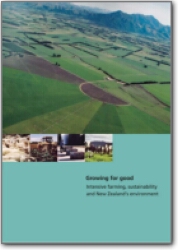September 2013
VIEWPOINT
with John Barnes, Managing Director – September 2013
Spring
Spring is here and we can hopefully put meat exporting hold-ups and Fonterra problems behind us and get on with the serious business of fattening lambs, growing wool and producing milk.
In spite of all the efforts over the years to diversify we are still a food producing nation and, thanks to all our farmers, we do it well. It does pay to remember the fact that we are producing food for consumption thousands of kilometres away, and how they perceive us and our farming practices is important.
At Fertilizer New Zealand we have made sustainability a watchword even before it became fashionable. But equally, we are determined that our farmer customers have a better bottom line profit than those of our competitors. It is all too easy for people in the farm supply chain to push ever more costly solutions onto farmers and we take care to ensure that our advisers do not do this. Without profit there is only a downhill journey which is not the path we want any of our customers to be on.
Recently I read of a trial farm where grass was in abundance to the point where they were wondering what to do with it, and in the next breath they were talking of applying more nitrogen. This is surely nonsense of the highest order, but it happens. You would be amazed at the stories I hear as I travel the country talking to farmers.
Our intention always is to reduce waste, because if it is not needed that nitrogen or extra fertiliser is very expensive at best, and worse it leaches into our streams and lakes. Long gone are the days when it was acceptable to just chuck a bit more on for good luck.
The Prime Minister is going to China later on this year to front up in person and assure the citizens of that country that our exports are safe and of the highest quality. This is admirable of him. However, this is not something that we want him to be doing too often, and so it behoves us all to make sure that things on the ground are as tidy as we can make them.
We take all of this very seriously indeed and we are doing our part by working with you to ensure a great outcome from great farmers.
In October 2004 the Parliamentary Commissioner for the Environment, Dr Morgan Williams released a very comprehensive report titled “Growing for Good” Intensive Farming, Sustainability and New Zealand’s Environment.
It was near the end of his tenure and he made the report brutally honest. The report shocked politicians, farmers and the public alike. Although written in the understated language of a bureaucrat it essentially said that we were not clean and green, in fact we were dirty and getting worse. The report challenged our cosy view of ourselves and was a wakeup call. In Parliament there was even concern that the report would harm our international reputation and damage trade.
Now almost exactly nine years later we are finding that he was right and his warnings were both insightful and correct. We have recently had the DCD scare with traces of this chemical being found in our milk and suffered the ignominy of having our exports to foreign countries temporarily halted because of contamination. Many farmers are now beginning to question other practices on their farms which are commonplace but heavily reliant on chemicals and therefore susceptible to the possibility of residue traces being found in the end product, be that milk, meat, eggs or fruit and vegetables. In other words… There but for the grace of God go I!!!
At Fertilizer New Zealand we began to do something about this many years ago when we first formed this company. We were determined to do things differently. Our methods and our products were somewhat different back then, but now they fit neatly into the category of what has come to be called the biological farming method. We advise a reduction in the use of chemical remedies but the increased use of natural trace elements and minerals. We encourage the living organisms in the soil including our long suffering friend the earthworm.
 The more mature among us will remember the so called bush sickness that prevailed in the pumice country of the central North Island. This was a practical demonstration of what a stark difference trace elements make. In that situation it was a cobalt deficiency and once added to the fertiliser mix the problem went away. We do the same thing today with equally impressive results. We routinely test the soils and herbage on our clients farms to ensure that all those elements that we humans need for good health are present. It goes without saying that our farm animals need those same trace elements for them to thrive.
The more mature among us will remember the so called bush sickness that prevailed in the pumice country of the central North Island. This was a practical demonstration of what a stark difference trace elements make. In that situation it was a cobalt deficiency and once added to the fertiliser mix the problem went away. We do the same thing today with equally impressive results. We routinely test the soils and herbage on our clients farms to ensure that all those elements that we humans need for good health are present. It goes without saying that our farm animals need those same trace elements for them to thrive.
We are what we eat and what we eat is most definately that which is provided by our soils. As a brief example, a study conducted in the United States of America has found that the trace elements that we need for good health have declined dramatically in the fruits and vegetables that we consume. Here are a few figures for you to ponder. These figures describe a dramatic reduction in these trace elements over the 51 years between 1940 and 1991.
Sodium -49% in vegetables and -29% in fruit.
Potassium -16% in vegetables and -19% in fruit.
Magnesium -24% in vegetables and -16% in fruit.
Calcium -46% in vegetables and -16% in fruit.
Iron -27% in vegetables and -24% in fruit.
Copper -76% in vegetables and -20% in fruit.
Zinc -59% in vegetables and -27% in fruit.
I suggest that when the opportunity arises you have a chat to a Doctor of Medicine and ask him or her what sicknesses a lack of each of these minerals in your body brings about. Then compare that bit of research to the prevalent sicknesses in our society and it may well answer a few questions for you.
The Fertilizer New Zealand programme that we like our farmers to adopt is one where dear old mother nature does the hard yards for us. We urge our customers to be “clover farmers”. Stimulate the grasses in early spring with a little nitrogen by all means, and again in the autumn. But for the remainder of the year our clover pastures will produce all the nitrogen that our pastures need, perfectly naturally and for free.
We talk about trace elements being vital to human health and by far the best and most natural way to get these base elements is from the soil. The plant absorbs them from the soil and we in turn absorb them from the plant or in the case of pastoral farming, from the animal who has absorbed them from the plant.
What keeps humans healthy also keeps animals healthy and therefore if an animal is not getting all the elements for good health it too will suffer ill thrift. Therefore it holds true that milk fever, staggers and bloat can be remedied by the uptake of the right trace elements. Magnesium is the known remedy for staggers, calcium for milk fever, and sodium for bloat. Where deficiencies exist, all of these trace elements can be introduced to the soil through the fertiliser programme.
The judicious use of fertiliser that has a sustained release of phosphate to the plant, like reactive phosphate rock, and the minimisation of chemicals will go a long way towards solving our problems of leaching and the degradation of our waterways and lakes. It will also avert another chemical contamination incident.
Fertilizer New Zealand is proud to be able to say that we were there at the beginning driving change and we intend to stay in that position for the foreseeable future. We believe that the nutrient tank of our soils should be maintained and in doing so we will revive our soil health and keep farming profitable and environmentally sustainable.
That is a big challenge but we are up to it. Give us a call.
http://www.pce.parliament.nz/assets/Uploads/Growing-for-Good.pdf
http://www.teara.govt.nz/en/document/14187/bush-sickness




